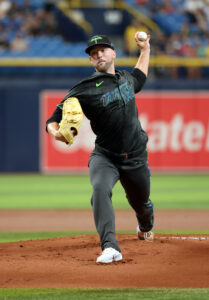The Athletics have finalized their season-opening rotation, reports Martín Gallegos of MLB.com. The five spots will be taken by Luis Severino, Jeffrey Springs, JP Sears, Osvaldo Bido, and Joey Estes, though not necessarily in that order. Mitch Spence will pitch out of the bullpen, at least to start the season.
There was never much doubt about the first three. Severino has been almost exclusively starter dating back to his 2015 debut. He has had some injury absences and some wobbles in his performance, but he just posted a 3.91 earned run average over 31 starts for the Mets last year. The A’s gave him a three-year, $67MM contract in November, the largest guarantee in franchise history, hoping that he would serve as a veteran anchor for the starting staff.
Springs emerged as a viable rotation candidate with the Rays in 2022, starting the year in relief but eventually posting a 2.46 ERA over 135 1/3 innings. Tommy John surgery wiped out most of the past two seasons but he returned to the Rays last year and had a 3.27 ERA over seven starts. That was enough for the A’s to send three young players and a competitive balance round pick to Tampa in order to acquire Springs and Jacob Lopez. Sears made 64 starts for the A’s over the past two seasons with a combined ERA of 4.46.
The last two spots were a bit more up for grabs. Estes had a decent but not overwhelming season in 2024, his first extended look in the majors. He tossed 127 2/3 innings over 24 starts and one relief appearance with a 5.01 ERA. His 16.9% strikeout rate was well below average but he demonstrated strong control with a 5% walk rate. He’s had a decent spring, with 11 2/3 innings of six-run ball, a 4.63 ERA. He’s only punched out eight opponents but also given out just one walk and hit one batter.
Bido tossed 63 1/3 innings for the A’s last year over nine starts and seven relief appearances with a strong 3.41 ERA. His 10% walk rate was a tad high but his 24.3% strikeout rate was a bit above average. This spring, those rate stats have been similar, as he has struck out 25.4% of batters faced and walked opponents at an 8.5% clip. The 9.24 ERA certainly looks ugly but that’s mostly due to one really bad outing. Against Cleveland on March 7, he tossed 3 1/3 innings and allowed eight earned runs on nine hits, including four home runs, despite notching four strikeouts against just one walk.
Spence was a Rule 5 pick last year and worked out well. He logged 151 1/3 innings over 24 starts and 11 relief appearances with a 4.58 ERA. His 19.4% strikeout rate was subpar but he limited walks to a 6.4% clip and also got grounders at a strong rate of 48.4%. In the small sample of his spring work, his results have backed up slightly. He has only punched out 14% of batters faced while his grounder rate is down to 43.6%.
The spring stats are all miniscule samples but it seems Bido and Estes have edged out Spence for the final two rotation spots. As mentioned, Bido’s 9.24 ERA is rough but mostly inflated by one awful game. Since his strikeout and walk numbers are in line with last year’s, that is probably going to be overlooked as a blip. Estes has broadly posted numbers fairly similar to what he did last year. Spence, meanwhile, has seen his strikeout rate drop from an already subpar level. Again, we’re not talking about meaningful sample sizes here, but the A’s had to make a decision.
A club’s opening-day rosters are only a snapshot in time. Over the course of a long season, things will change and the mix will surely look different over the coming months. That’s especially true on a pitching staff, where injuries are almost inevitable. Spence will be in the bullpen for now but will likely have opportunities to get into the rotation later, as he did last year. The A’s will also have guys like Hogan Harris, J.T. Ginn, Gunnar Hoglund, Ryan Cusick and Lopez jockeying for opportunities. Brady Basso and Ken Waldichuk will start the season on the injured list but could factor into the mix later in the year.
 Springs was able to cash in on his big season with a life-changing contract extension, but his long injury layoff turned him into an odd man out of the Rays’ rotation.
Springs was able to cash in on his big season with a life-changing contract extension, but his long injury layoff turned him into an odd man out of the Rays’ rotation. 